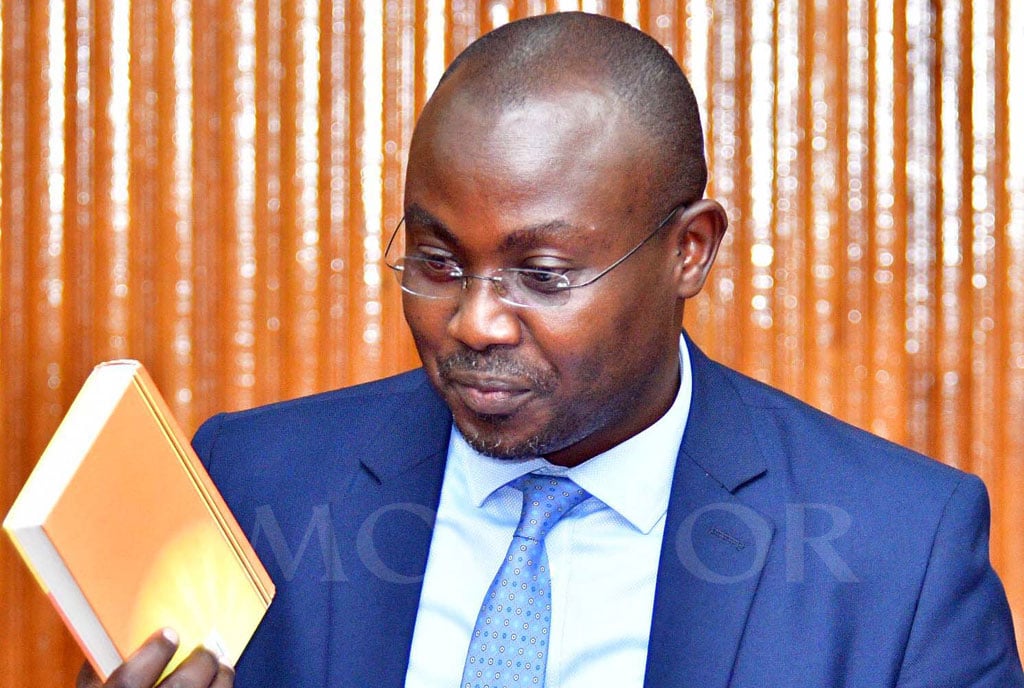Prime
UCDA boss loves the aroma in coffee deal

Coffee farmers appear before the Trade Committee at Parliament on April 26, 2022. PHOTO/DAVID LUBOWA
The Executive Director of Uganda Coffee Development Authority (UCDA) yesterday backed the coffee agreement that the government of Uganda signed with Uganda Vinci Coffee Company owned by Italian investor Enrica Pinetti.
Members of Parliament’s Committee on Trade, Tourism and Industries, who are investigating the deal, had voiced opposition to some provisions of the memorandum of understanding, especially those interpreted to give the investor lengthy tax holidays and apparent monopoly.
Dr Emmanuel Iyamulemye, the UCDA executive director, told parliamentarians that the agreement did not contravene any provisions of the Coffee Act, and it is a “good deal” for the growth of Uganda’s coffee sector.
DON'T MISS: Who’s that girl? Peeling mask on Enrica Pinetti
Attorney General Kiryowa Kiwanuka, ho is the chief government legal advisor, and Finance Minister Matia Kasaija, signed the deal retailed as essential to promote value addition to coffee after Uganda withdrew from the International Coffee Organisation (ICO).
At yesterday’ session with MPs, Dr Iyamulemye said the coffee deal will help the country generate more money from sale of processed coffee, offer employment and other benefits to the country.
According to the agreement, the company plans to produce different segments of finished coffee products, in essence earning Uganda more in forex exchange than it has from exporting coffee beans
“The need for soluble coffee plant cannot be underscored, because since it is a final product, the volatility of the prices will be more controlled rather than the green coffee beans which are susceptible to price fluctuations,” Dr Iyamulemye said.
He also said with the rising global demand for coffee, the agreement gives UVCC a chance to process Uganda’s coffee to meet global demand which is projected to grow at 5.4 percent for the next half a decade.
“We foresee a rising competitiveness of Uganda coffee. Sale of coffee is one of the fastest growing segments globally and Uganda could capture some of this market through in-country production,” he added.
The UCDA chief executive, responding to concerns by some legislators, said he was under no pressure to defend the coffee deal that has polarised the nation.
Committee chairman Mwine Mpaka overruled long-serving MP Cecilia Ogwal when she demanded that Dr Iyamulemye be placed to speak under oath so that he could be held responsible in the event he lied.
Lawmakers were concerned that the coffee chief appeared to defend the investor, a label he rejected.
Mr Mpaka sought more documentary evidence from Dr Iyamulemye to back his submission.
Stakeholders’ protest
Earlier on, a section of the coffee industry players appearing before the committee offered insight into coffee trade and what needs to be done. The team comprised coffee farmers, producers and lawyers.
They cited unfair practices that they claimed disadvantaged them.
Mr Tony Mugoya, the executive manager Uganda Coffee Farmers Alliance (UCFA), said there is no reason why only UVCC was benefitting from tax incentives to the exemption of indigenous investors engaged in similar value addition
“We should look at the existing Ugandan companies that are doing this and provide the same incentives across the board. If the government’s priority is to promote value addition, let it be open to all players by having access to tax holidays, access to industrial parks, cheap electricity and financing...,” he said.
In an interview last night, Attorney General Kiwanuka said the incentives being extended to the Italian investor are available to Ugandans and indigenous investors need to read the law to understand how they qualify.
Our analysis of the coffee deal shows that it grants UVCC a decade-long tax exemption, free 25 acres of land in Namanve Industrial Park valued at $2 million (Shs7.3b), cheaper electricity and water tariffs and other kinds of benefits.
Mr Robert Kabushenga, a former chief executive of the largely state-owned Vision Group, who is one of the biggest coffee farmers in the country, said he is happy that Parliament is seized of matters relating the coffee sector.
“Coffee is one of the biggest promoters of tourism in Uganda. People now want to come to Uganda and see where this coffee is grown. A lot of coffee farmers today are investing in agro-tourism. If you interfere with our ability to attract people to come and see where Ugandan coffee is grown, the alternative business of agro-tourism in coffee will be lost,” he said.
Solutions
Mr Kabushenga proposed that coffee sector players be empowered to explore coffee value addition plans based on stakeholder consultation before the government designs a package of incentives to spur the business.
Former Uganda Law Society (ULS) president Francis Gimara said the deal with UNCC cannot be sufficient legal basis to afford the Italian investor the prescribed incentives.
Mr Gimara, who was presenting a legal opinion on the coffee deal, asked the committee whether if they were to retreat and write a report, it should consider whether today, under Uganda’s legal Framework, a Minister can grant additional [tax] exemptions in the presence of existing laws.
“We submit that where Parliament has made a law to govern a sector, then every government entity must abide by the law,” he said.
Finance minister Kasaija, the ministry Permanent Secretary, Mr Ramathan Ggoobi, Trade ministry officials as well as Ms Pinetti were a no-show at Parliament despite being summoned to appear.
MP Mpaka’s committee is expected to present its findings on the floor of Parliament tomorrow.




